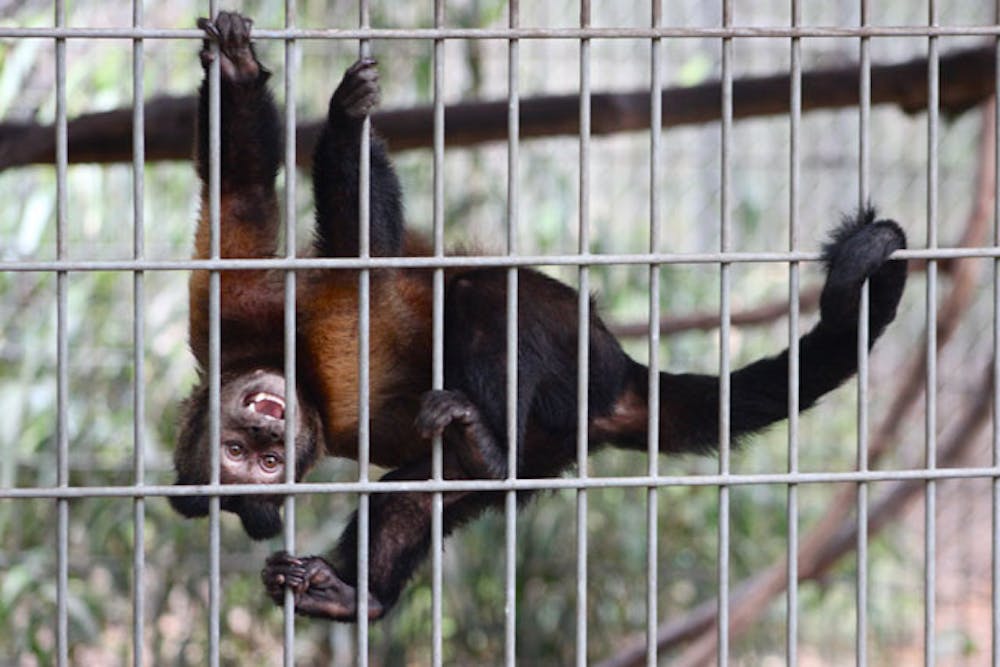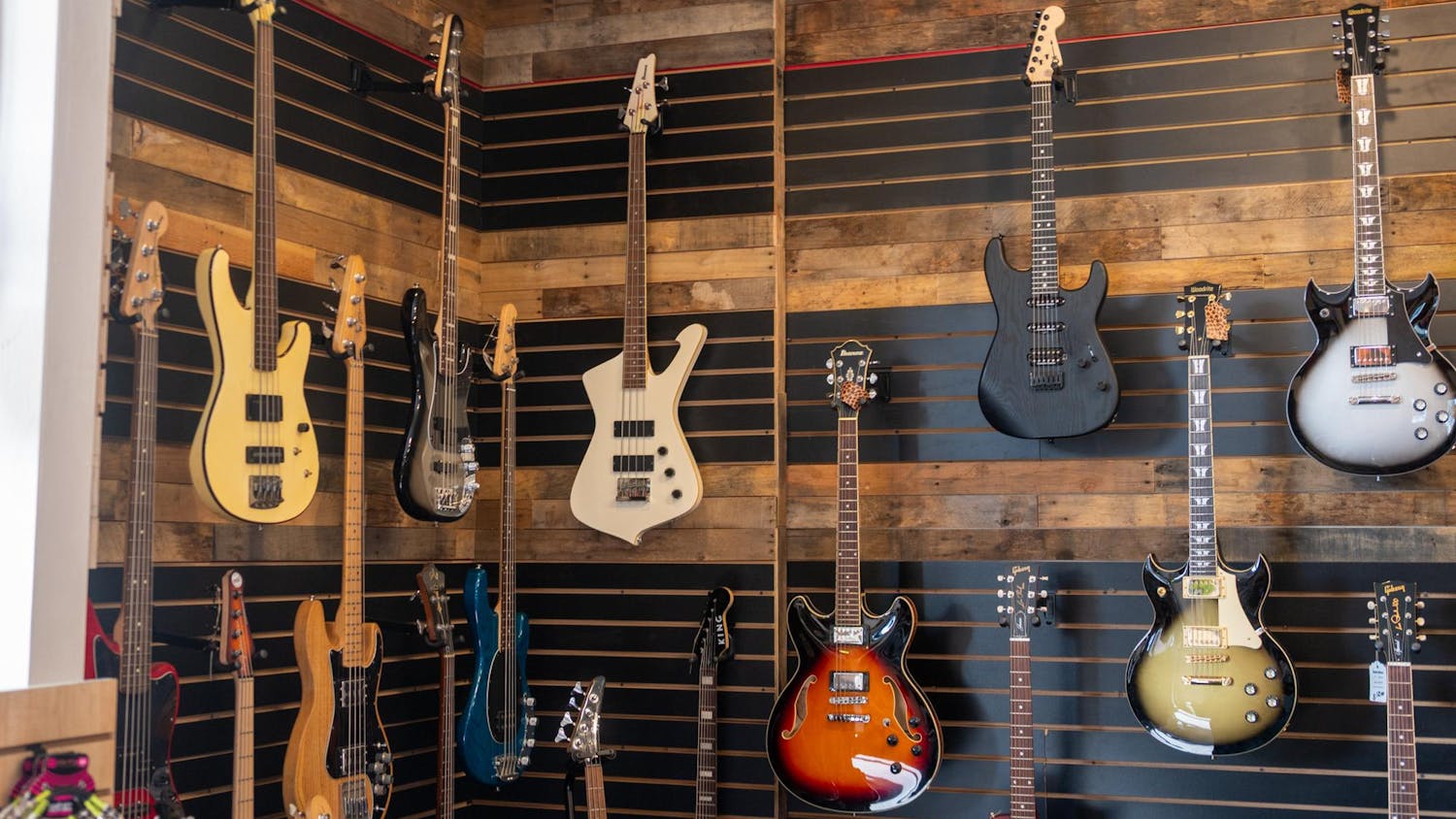When Shira Reid shows people around her workplace, she makes sure to introduce them to Iris. Iris is smart and outgoing, and she and Reid could chat all day.
When they get excited, their voices rise like 13-year-old girls at a school dance.
Iris wraps her tail around the wire of her habitat cage, raises her eyebrows and rocks from side to side. Reid, 28, is a caregiving apprentice at Jungle Friends Primate Sanctuary.
On weekends, she gives tours. On Saturday, she turned and explained to a tour group that Iris, a brown capuchin monkey, was flirting with them.
The group stood for another minute, then moved on to see more of the 155 monkeys housed there. The Gainesville nonprofit is not open to the public, but volunteers can tour the sanctuary. Jungle Friends takes in former pets, lab testing subjects and circus monkeys and gives them a “forever home.”
But after two more habitats are built, the Jungle Friends staff will have maxed out its 12 acres of land, and people want it to take more monkeys.
They have to build the habitats 100 feet in from the property lines, said Lee Ward, 56, the sanctuary’s head caregiver. The neighbors don’t want monkeys throwing biscuits at them or waking them up with early-morning chattering.
Kari Bagnall, 58, who founded Jungle Friends in 1998, said the nonprofit needs $250,000 to be able to buy the 20-acre lot next door and expand. Requests to take monkeys are flooding in, but the cash flow is dribbling. The money that has come in recently is going to the two habitats being built on the current grounds.
It’s not cheap to run a primate sanctuary — $20,000 to $25,000 a month, Bagnall estimated. There’s maintenance, outdoor heat lamps, medical expenses and food.
Marmosets alone have a breakfast bowl of fruits, vegetables, rice or cereal, soup and canned marmoset food — and they’re only 8 inches long from head to toe.
That size doesn’t matter, though, when they’re leaping across the cage for food.
One of the marmosets nibbled on a raisin-sized chunk of citrus. The monkeys peered up like they were sizing up the passersby. Some of them climbed to eye level, and they reached long-fingered hands out between the bars to greet one of the Jungle Friends workers.
They’re so human, Bagnall said, that people think they can be the child a couple is missing. Breeders say they make great pets, and people want to raise them from infancy.
“You just type in ‘monkey’ on Google and you get all those pet monkey sites,” she said.
The pet industry was what got Jungle Friends started in the first place. Years ago, Bagnall’s boyfriend bought her a pet monkey named Samantha. The brown capuchin attached herself to her owner’s arm. Bagnall had to teach the monkey to switch arms so she could get dressed every morning.
“I’m sure there’s a 12-step program for that,” she joked.
Bagnall eventually left the boyfriend but kept the monkey. She wanted to find Samantha a friend, she said, and she located Samantha’s sister, Charlotte, who was with a breeder. Bagnall couldn’t afford to buy Charlotte, so she helped care for the monkeys in exchange for Charlotte. From there, she started collecting exotic animals, but Bagnall eventually decided to limit herself to monkeys.
Internet research indicated that the humidity in Gainesville would be better for the monkeys than the dry heat of her home in Las Vegas, so Bagnall sold almost everything she owned to make the move and start Jungle Friends.
It wasn’t much in the beginning. In 1998, 13 monkeys were installed in four makeshift habitats meant for storing corn. But over the years, more people heard about the institute, more workers came, and Ward moved from Texas after a few years of traveling between her home and the preserve in Gainesville.
Ward and her partner now live in a small, one-story house, a five-minute walk from the office at Jungle Friends. She started her own smaller private sanctuary, Koreymonde Capuchin Rescue, in 2007. Ward named it after her first monkey, Korey, a white-faced capuchin. Korey has since been joined by 20 other white-faced capuchins and a 15-year-old goose named Abby.
Between the two monkey sanctuaries, though, lie 20 acres of open fields with a small house. If Bagnall could buy the property for Jungle Friends before someone else snatches it up, she could have more living space for interns, room for expansion and easy access to Koreymonde.
They could bring in more monkeys, and Bagnall said her ultimate goal is to see animals out of research and monkeys out of the pet trade.
But in the short term, this land could make a big difference for Jungle Friends. Even if she couldn’t afford to build, Bagnall could hold on to the land until she has more money. She could eventually build an on-site veterinary clinic and maybe get equipment donated.
She could save lives and give a home to monkeys that have never had them.
But she needs help.
Contact Clare Lennon at clennon@alligator.org.
A brown capuchin monkey hangs from its cage at Jungle Friends Primate Sanctuary.






